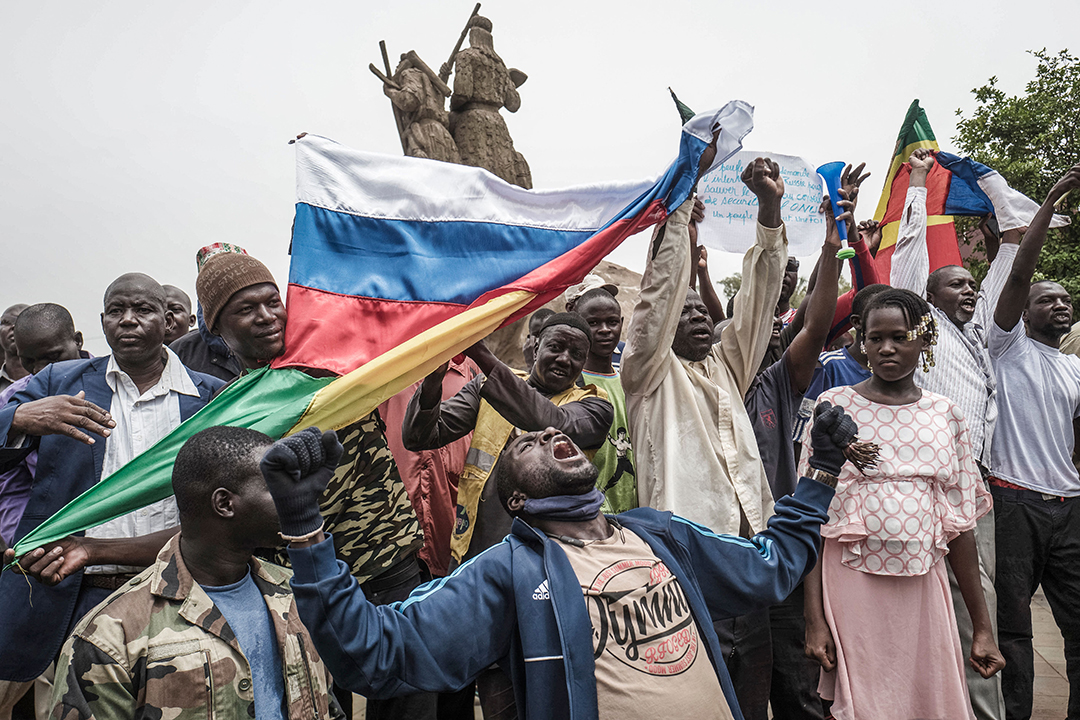Russian Path to Mali Paved With Disinformation
ADF STAFF
A pro-Russian demonstration on the streets of Bamako, Mali, was meant to look spontaneous. It was anything but. Days after the country’s second coup in nine months, hundreds of pro-military demonstrators marched from the central square to the Russian embassy while waving Russian flags and holding anti-French signs.
The gathering on May 27 was designed to appear like a grassroots show of support, but it was planned at an army base and led by members and relatives of the military.
“We came to support our men, to support the army and to ask Russia to come and help us,” a Soldier’s wife told Agence France-Presse.
Another confirmed that demonstrators met the day before at Kati military barracks, about 16 kilometers northwest of the capital, to plan the event.
“We did it because we believe the army means well for Mali and deserves the support of every Malian,” Moussa Troure told The Daily Beast. “Russia loves us.”
Disinformation campaigns dating back to 2019 were connected to Mali’s earlier coup in August 2020 after protests that saw the ouster of democratically elected President Ibrahim Boubacar Keïta.
Seeking to expand its influence in Mali for several years, Russia is suspected of paying activists and influencers and using fake and hacked social media accounts to amplify propaganda.
Lacking oversight and fact-checking agencies, Mali’s government and media environment provide ample opportunities to manipulate the public.
A July 2021 study by French researcher Maxime Audinet, titled “The Lion, the Bear and the Hyenas: Russian Informational Practices and Narratives in Sub-Saharan Africa,” showed how Russian propaganda spread online through multimedia platforms like state-run Russia Today and Sputnik after the creation of French-language editions.
Audinet’s research found that Malian traffic to the Russia Today France website surged to 16,628 visits per month in 2020. At the same time, Sputnik France’s audience grew in Mali with 107,360 visits per month.
“As part of their strategy of seduction, the Russians are trying to bring together narratives rooted in their country, such as defending sovereignty,” Audinet told The Africa Report magazine. These are “narratives already rooted in Africa, which denounce Western interference and Françafrique.”
France and Russia wage information warfare on social media, and both have faced repercussions.
In December 2020, Facebook and Instagram took down more than 500 accounts, pages and groups originating from Russia and France that had targeted 13 African countries, including Mali.
Russia is keen to take advantage of already simmering Malian tension with France, according to Andrew Lebovich of the European Council on Foreign Relations (ECFR), whose research focuses on the Sahel.
“The prevalence of social media does create susceptibilities to disinformation, as it does in many other countries,” he told ADF. “Mistrust in particular of France stemming from the colonial period and post-colonial policies also plays a role.
“This context is also why we need to have a nuanced and informed view of the impact of misinformation and disinformation. While it certainly plays a role — sometimes a very important role — it is not the only explanation for things like anti-French sentiment in the country.”
Disinformation operations and soft-power tools to boost Russia’s image in African countries have given the country a foothold toward establishing military and technical cooperation with its advisors and mercenaries.
The culmination of recent tension was a September 2021 report by Reuters news service that Mali and Russia were close to a deal that would allow at least 1,000 Wagner Group’s Russian mercenaries to operate in the West African country.
Some of Mali’s allies have warned that the presence of Wagner could further destabilize the country and cause foreign countries to withdraw troops serving in peacekeeping and training operations.
Lebovich believes their pushback may have given Mali pause.
“A deal between Mali’s transitional government and Wagner Group was prepared, but never signed,” he wrote for ECFR.
“Although international pressure may have helped deter Mali’s government from going ahead, other factors, including Wagner’s grotesque behavior in countries such as Central African Republic and a lack of interest from Wagner in Mali’s mineral offerings, may have also played a role.”


Comments are closed.